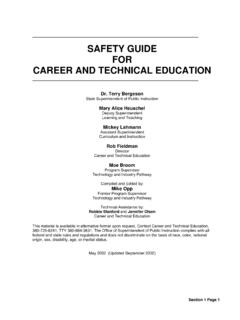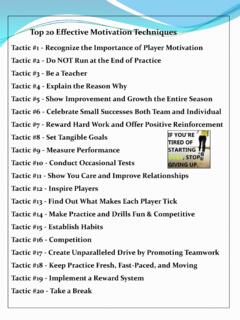Transcription of SKILLS FOR SUCCESSFUL MENTORING - my.lerner
1 ### CCC502-02 SKILLS FORSUCCESSFULMENTORING:Competencies ofOutstanding Mentorsand Menteesby Linda Phillips-Jones, $ FORSUCCESSFULMENTORING:Competencies ofOutstanding Mentorsand Menteesby Linda Phillips-Jones, $ can be learned, and relationships canbe better more enjoyable, productive, andeven time-efficient as a research by The MENTORING Grouprevealed that unless a fairly structured processand specific SKILLS are applied, mediocrementoring relationships occur. Not muchhappens, and participants become frustratedwith their well-intended but haphazard , disappointed participants becomeconvinced that MENTORING doesn t the positive side, when individuals usethese SKILLS and add structure, important,satisfying changes take place in the lives of bothmentees and skill is a learned, observable behavior youperform that indicates (to someone else) howwell you can do something.
2 The set of skillsdescribed here constitutes your overall abilityto mentor and be you possess these SKILLS to an adequatequality level and if you use them as frequentlyas called for your chances of having mutuallysatisfying and productive MENTORING relation-ships will be greatly enhanced. The model onthe next page illustrates the shared core skillsused by both mentors and mentees and theunique SKILLS needed by each help you be a more skilled mentor andmentee, look at the model, review the de-scriptions of these MENTORING SKILLS and thebehaviors that make up each one, and startusing the SKILLS with the people in your FOR SUCCESSFUL MENTORINGE ffective MENTORING requires more thancommon sense.
3 Research indicates thatmentors and mentees who develop andmanage SUCCESSFUL MENTORING partnershipsdemonstrate a number of specific, identifiableskills that enable learning and change to takeplace. This strategy booklet describes theseskills and provides a tool for you to assessyourself informally on each Identification of MENTORING SkillsFor years, individuals assumed that theprocess of MENTORING was somewhat myster-ious. These relationships just happened, and chemistry had to be present. It was impos-sible (even somewhat sacrilegious) to analyzeand describe the specifics of what was goingon in these arrangements.
4 Analyzing and puttingnames to behaviors would theoretically kill people were able to find mentoringrelationships, while many individuals wereunaware of how to get started with mentoringand missed out on one of the most powerfuldevelopment strategies ever Phillips-Jones (1977) studied hun-dreds of mentor-mentee partnerships as wellas individuals unable to identify any mentors intheir lives. The conclusion: MENTORING was muchmore examinable and yet more complex thanfirst the demystifying side, Phillips-Jonesdiscovered that effective mentors and menteesuse specific processes and SKILLS throughouttheir relationships.
5 Further, the SKILLS and 2003 by Linda Phillips-Jones, , The New Mentors and Proteges2 THEMENTORINGSKILLSMODELSHAREDCORESKILLSM ENTEE-SPECIFICSKILLSMENTOR-SPECIFICSKILL SA cquiringMentorsLearningQuicklyShowingIni tiativeFollowingThroughManagingtheRelati onshipInspiringProvidingCorrectiveFeedba ckManagingRisksOpeningDoorsInstructing/D evelopingCapabilitiesListeningActivelyId entifyingGoals&CurrentRealityEncouraging BuildingTrustCore MENTORING SkillsBoth mentors and mentees should utilize thefollowing core SKILLS in their MENTORING Listening ActivelyActive listening is the most basic mentoringskill; the other SKILLS build on and require you listen well, you demonstrate to yourmentors and mentees that their concerns havebeen heard and understood.
6 As a result, theyfeel accepted by you, and trust builds. The wayyou indicate you re listening intently is byperforming several observable behaviors. Forexample, if you re an excellent listener, you: appear genuinely interested by mak-ing encouraging responses such as Hmmm .. and Interesting .. orsometimes reflecting back (para-phrasing) certain comments to showyou ve grasped the meaning andfeelings behind the message; use appropriate nonverbal languagesuch as looking directly into people seyes, nodding your head, leaningslightly toward them, frowning, orsmiling where appropriate; avoid interrupting mentors andmentees while they re talking; remember and show interest inthings they ve said in the past ( Bythe way, how did the meeting withyour manager go?)
7 ; and summarize the key elements of whateach of you the impulse always to turn the con-versation to your experiences and opinions andto find immediate solutions to problems you maybe hearing. Listen carefully first; problem solvemuch later. If your mentors and mentees havea habit of immediate problem solving, see if youcan help them be better listeners and Building TrustThe more that your mentors and menteestrust you, the more committed they ll be to yourpartnerships with them, and the more effectiveyou ll be. This trust develops over time if yourmentors and mentees observe certainappropriate behaviors on your part. To becometrustable, you must: keep confidences shared by yourmentors and mentees; spend appropriate time together; follow through on your promises tothem; respect your mentors and mentees boundaries; admit your errors and take responsi-bility for correcting them; and tactfully tell your partners if and whyyou disagree or are dissatisfied withsomething so they ll know you rehonest with with cross-difference ( ,gender, culture, style, age) MENTORING , trust-building is crucial and has to be developed EncouragingAccording to Phillips-Jones research, themost valued MENTORING skill is giving encour-agement.
8 This includes giving your mentoringpartners recognition and sincere positive ver-bal and mentees at several Fortune 500companies revealed in interviews that positiveverbal reinforcement praise was rare andeven publicly discounted in their organiza-tions. However, most admitted enjoying beingrecognized for accomplishments and abilitiesand receiving positive feedback providedsuch attention was sincere and not said they wished such behaviorswere a greater part of their organizational was the last time you received toomuch praise? If never, you re not alone. Effectivementors encourage their mentees, which in turnhelps increase the mentees confidence andenables them to the same time, SUCCESSFUL menteesmake a point of positively reinforcing theirmentors, which serves to keep the mentorsfocused and motivated.
9 Provide genuine, positive feedback to your mentors and menteeson a regular there are many ways to encourage,and mentors and mentees can differ in the typesand amounts of encouragement they like, youcan: compliment your MENTORING partnerson accomplishments and actions; point out positive traits (such as per-severance and integrity) in addition totheir performance and accomplish-ments; praise them privately, one-on-one; commend them in front of other people(being sensitive to any cultural andstyle preferences regarding publicpraise); express thanks and appreciation; write encouraging memos or e-mailand leave complimentary voice mail;and let them know how you use any helpthey give certain that your praise and encour-agement are sincere.
10 In MENTORING , err in thedirection of too much praise, rather than too human development experts recommenda ratio of four or five praises for every Identifying Goals and CurrentRealityWhether you re a mentor or mentee, youshould have a personal vision, specific goals,and a good grasp of current reality. As a mentor,be clear on and talk to your mentees about theirvisions, dreams, and career/life goals. They llbe interested in your current reality (your viewof your strengths and limitations as well as thecurrent reality of situations within yourorganization) and want help recognizing theirsas a mentee, you also need this skill.


